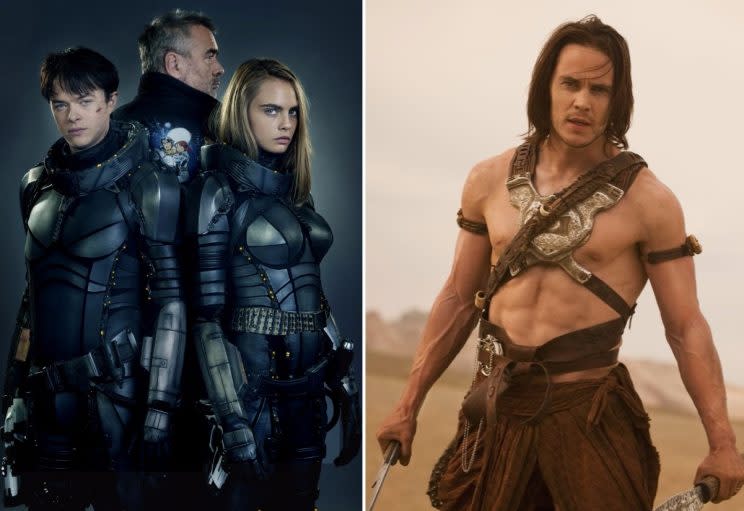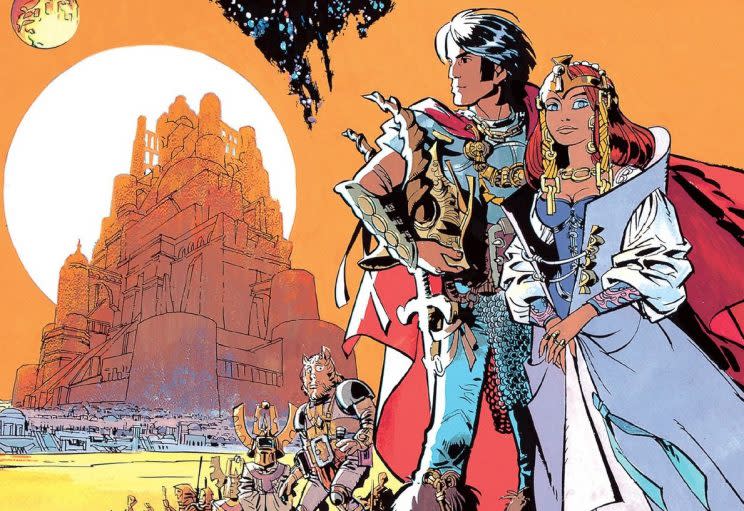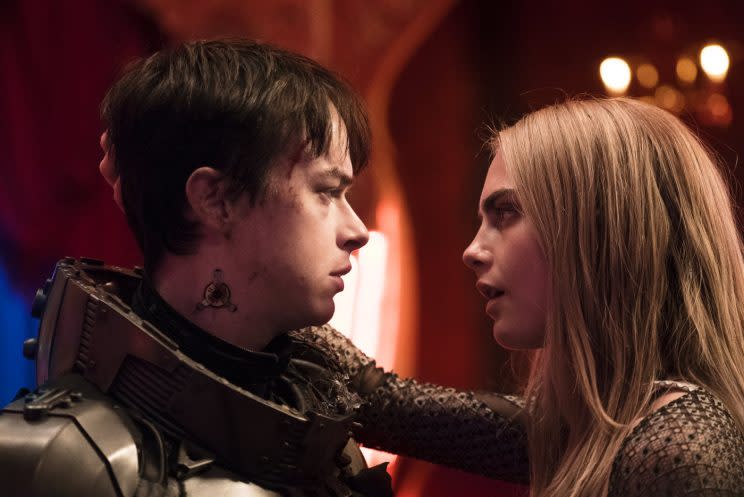Will Valerian and the City of a Thousand Planets be this year's John Carter?

Stop us if you’ve heard this before: there’s an ambitious, megabudget sci-fi movie coming based on a decades-old property, not particularly well-known to contemporary audiences, but long noted as a key influence on ‘Star Wars.’
This very sentiment was expressed often in early 2012, prior to the release of Disney’s ‘John Carter,’ the (very) long-in-development movie adaptation of Edgar Rice Burroughs’ 1912 story ‘A Princess of Mars,’ the first book in the ‘Tarzan’ creator’s influential sci-fi fantasy saga ‘John Carter of Mars.’ Now, in July 2017, we can speak similarly of ‘Valerian and the City of a Thousand Planets,’ director Luc Besson’s adaptation of the ‘Valerian and Laureline’ comic strip.
Given how ‘John Carter’ turned out, it’s easy to anticipate ‘Valerian’ meeting a similar fate – not least as it’s opening in US cinemas this Friday, 21 July, back-to-back with Christopher Nolan’s feverishly anticipated ‘Dunkirk’ (although, quite sensibly, distributor Lionsgate has held off releasing it in the UK until 2 August).
Even so, should we really be so quick to write off ‘Valerian’ as an inevitable flop? And, while we’re on the subject, did ‘John Carter’ really deserve the bum reception it got?

Created by writer Pierre Christin and artist Jean-Claude Mézières in 1967, ‘Valérian and Laureline’ is a key title in France’s rich sci-fi comic culture. As well as being a very significant influence on ‘Star Wars,’ ‘Valérian and Laureline’ was also a key inspiration for Luc Besson’s first space opera, 1997’s ‘The Fifth Element.’ Besson even went so far as to hire Mézières to help design the film, and has since remarked that the artist asked him at the time, “Why are you doing this s***y film? Why you don’t do ‘Valerian?’”
While not everyone would agree with Mézières’ assessment of ‘The Fifth Element’ (this writer for one regards it one of the finest sci-fi films of the 1990s), it seems his remarks were enough to plant the seed of a ‘Valerian’ movie in Besson’s head – and after 2014’s ‘Lucy’ proved the director’s biggest hit yet ($463 million worldwide), he had the clout to get the project off the ground.
Tributes pour out for George A Romero
Disney plans Star Wars hotel
Wookie pal for Chewie in Han Solo spin-off
Where ‘Valerian’ is very much the long-standing dream project of one specific filmmaker, ‘John Carter’ had a considerably more fractured history. Various takes on ‘A Princess of Mars’ were touted over the decades, before Parmount purchased the rights in the 2000s. Robert Rodriguez, Kerry Conran and Jon Favreau were all attached to direct at different points, but the project failed to gain momentum until Disney picked it up, and hired director Andrew Stanton (‘Finding Nemo,’ ‘WALL-E’) for what would be his first – and, to date, only – live-action feature.

The marketing campaign behind ‘John Carter’ remains the subject of some controversy. Many questioned the decision to drop ‘- of Mars’ from the title, a move allegedly rooted in concerns that films with ‘Mars’ in the title usually flopped (the most frequently cited examples being ‘Mission to Mars’ and ‘Mars Needs Moms’). Still, while the critical reception was mixed, hopes were still high among sci-fi fans that the film would prove successful enough to launch a franchise (Burroughs had followed ‘A Princess of Mars’ with a further 9 novels, after all).
The result was, of course, quite the opposite. While ‘John Carter’s $284 million earnings would seem respectable, the film cost Disney a staggering $306.6 million, and as such made a significant loss. All of which was a shame, as, while it definitely suffers from tone and pacing problems, ‘John Carter’ really isn’t that bad a film – yet it now seems doomed to be forever remembered as one of the biggest flops ever.
It’s hard not see some warning signs for ‘Valerian.’ With a reported $180 million budget, it’s the costliest French film ever. And like ‘John Carter,’ which cast the largely unknown Taylor Kitsch and Lynn Collins in the lead roles, ‘Valerian’ also has largely untested, perhaps unlikely stars in Dane DeHaan (‘Chronicle,’ ‘A Cure for Wellness’) and Cara Delevingne (‘Suicide Squad’).

Still, ‘Valerian’ has one thing that ‘John Carter’ didn’t: a firmly established director. Since making his name with ‘The Big Blue,’ ‘Nikita’ and ‘Leon,’ Besson has been arguably the biggest French filmmaker of the past 30 years, as well as a powerhouse producer responsible for, amongst others, the ‘Taken’ and ‘Transporter’ franchises. (Yes, Liam Neeson and Jason Statham both owe their tough guy status to Besson.)
Besson has already insisted that, despite the budget, ‘Valerian’ does not represent a financial risk to his company EuropaCorp, and also stresses he’s anxious to make a franchise out of it, having already started work on two further screenplays; as with ‘John Carter,’ there’s no shortage of existing material to adapt.
So far, ‘Valerian’ has proved divisive among critics, although with a current Rotten Tomatoes score of 72%, the positive reviews outweigh the negative (for reference, ‘John Carter’ wound up with a 51% rating). Now, the only question remains – will audiences turn up, and will the film prove to their liking?
This writer for one certainly hopes so. Sure, ‘Valerian and the City of a Thousand Planets’ doesn’t appear too far removed from ‘Star Wars’ or ‘Guardians of the Galaxy;’ but in a marketplace where multiple superhero properties can perform well simultaneously, I see no reason there shouldn’t be as much room for space operas, particularly when, with ‘The Fifth Element,’ Luc Besson has already proven himself in the genre.
‘Valerian and the City of a Thousand Planets’ opens in UK cinemas on 2 August.
Read More:
Mark Rylance praises Dunkirk co-star Harry Styles
Thrilling new footage from Star Wars: The Last Jedi
Two mystery DC Comics movies scheduled for 2020

 Yahoo Movies
Yahoo Movies 

